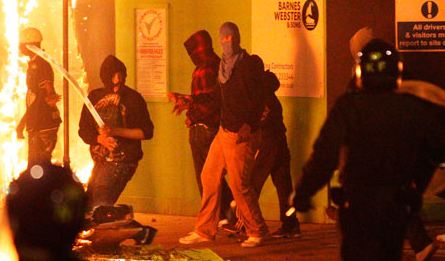Secular society can only make sense of the riots through the language of morality. But the church is struggling, too
By Albert Radcliffe
The question: Is there a spiritual response to the riots? The riots in London, the Midlands, Liverpool and Manchester have been analysed from just about every angle: the sociological, psychological, moral and even the aesthetic, but Russell Brand’s Guardian article was a reminder of their underlying spiritual significance.
We say something is “spiritual” when it nourishes our sense of self and the self’s sense of its own worth. The spiritual is made up of all those inner realities of conscience and imagination that lie beyond the rational and emotional sides of our nature. For example, deep-seated, life-shaping attitudes are not the products of reason or feeling: they are created by events and relationships functioning permanently deep within our lives.
In a secular society like ours, the “spiritual” is a forgotten category, though it underlies all others. Its loss means that we can no longer understand adequately things like hope, trust, love and meaning. All that we have left to make sense of the recent evils of arson and looting is the language of morality, and that goes nowhere near deep enough.
Yet to say that something is spiritual is not to say that it’s therefore a good thing, a temptation for those attempting to live without religion; for just as our emotional lives can be stunted and corrupted, so too can our spiritual. The test for a healthy spirituality is always: “Does it shape us for the better or for worse; does it makes us more human or less?”
England is a society that’s increasingly adrift spiritually. It’s not that we live unspiritual lives – not even criminals can do that – but when we have no experience of healthy spiritualities we are likely to opt instead for those that are emotionally destructive and morally dysfunctional.
I wish as an Anglican priest I could point uncritically to the Christian faith or to my own church for obvious answers to this recent upsurge in criminal violence – for until quite recently the church was England’s chief access to the spiritual dimension in life. But I can’t because, together with other institutions in our world, secular as well as religious, we are now, all of us, in serious spiritual trouble. Religions, too, are spiritually vulnerable.
Market capitalism, Christianity’s chief secular substitute, produces material goods and political freedoms in plenty; and these are good, though not when used to exclude other good things essential for spiritual health. The spiritual wells of our social life are running dry and the problem, being at root a spiritual one, affects everything. Believers, agnostics and atheists are in this together. This in no way excuses the breakdown in law and order, but it does explain why sermons from politicians and harsh sentences by the courts will prove inadequate for mending “broken Britain”.
The spiritual life of individuals and societies is built traditionally upon stories and rituals, teaching and example, discipline and prayer; but as the Christian basis of our culture has been largely abandoned, its place has not been taken by secular equivalents. Healthy spirituality is always creative; unhealthy spiritualities are invariably destructive. Religion might be only one spiritual resource among the many that we need, but without it we are on starvation rations.
The spiritual deficit in a multifaith society should concern unbelievers as well as believers. Christian humanists like myself should be in dialogue with secular humanists, as well as those of other faiths, for human nature is at root a spiritual nature. It should be well nourished among poor and wealthy alike. As WH Auden wrote, though alas in a line he came to regret: “We must love one another or die.”
See online: We are all in serious spiritual trouble

